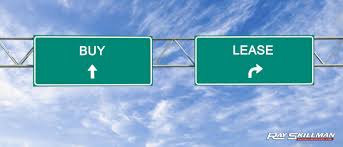So what’s the bottom line? Is it better to lease or to own?
As a fleet manager or owner, you’ve probably asked yourself this question more than once.
Although not as simple as saying that one is better than the other, it ultimately boils down to cost, efficiency and the goals you’ve set for your company,
to make this determination – and answer the question – let’s consider several important variables that play a roll.
- Budget,
- Company size,
- Corporate image,
- Vehicle usage
- Your company’s overall goals.
Let’s talk about purchasing for a moment. The process is really not much different than buying a house.
Identify your needs, explore what the market has to offer – and which will satisfy those needs – negotiate terms and conditions and then fulfill those needs.
Here are some real benefits to the purchasing option;
1) Once you’ve made the purchase, there are no limitations imposed by a third-party – such as mileage or usage
– meaning you can use it as much or as little as you see fit.
2) Once you’ve assessed that you no longer need it, you can put it back on the market.
3) When purchasing, you also have much more leverage when it comes to price negotiation.
4) Lastly, let’s not discount depreciation. True, vehicles lose value over time, however your business might very well be able to benefit, by deducting taxes to balance your profits.
Now the second option –leasing. Leasing comes with its own set of possible benefits.
1) Firstly, your company gets to hold onto long term capital – since leasing contracts are cheaper than purchase agreements on a monthly basis.
2) Also, let’s consider costs. When you lease a vehicle, it is almost invariably a newer model. These require less corrective maintenance and are often more fuel efficient.
3) Unlike purchasing, leasing also has less of an impact on your company’s balance sheet, making your debt-to-equity ratio more attractive to possible investors.
4) Additionally, leasing comes with a couple of extra benefits – including less of the necessary bureaucracy. Since you don’t own them, you can leave all the paperwork to the lessors, giving you more time to spend on more important matters.
5) Last, but not least, leasing can boost your corporate image.
With a fleet of company owned vehicles, there is always the risk of having your fleet looking less than brand-new.
Other than corrective maintenance, companies tend to postpone or ignore esthetic issues. Leased vehicles on the other hand are bound to be updated and upgraded to the latest models, giving your company the image of reliability and success – not to mention giving your drivers a sense of pride and a safer feeling environment to work in.
A good general rule of thumb is that if your vehicles go through lots of wear and tear and your company has a low rate of vehicle turnover, then purchasing is a great option
On the other hand, if you have a high vehicle turnover rate and your company requires a broader and more extensive preventive maintenance schedule, then consider leasing as these issues can often be negotiated with the lessor.





